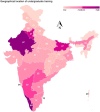Scorpion Sting Envenomation, a Neglected Tropical Disease: A Nationwide Survey Exploring Perspectives and Attitudes of Resident Doctors from India
- PMID: 37696517
- PMCID: PMC10551078
- DOI: 10.4269/ajtmh.23-0194
Scorpion Sting Envenomation, a Neglected Tropical Disease: A Nationwide Survey Exploring Perspectives and Attitudes of Resident Doctors from India
Abstract
Scorpion sting envenomation (SSE) is a commonly encountered and a significant problem in the tropics, affecting rural and marginalized communities. However, it is not formally listed as a neglected tropical disease (NTD) by the WHO. We designed this cross-sectional study to explore medical graduates' and resident doctors' perspectives on SSE as an NTD and to assess their experiences, knowledge, and confidence in managing these patients. An online questionnaire was developed, validated, and administered to interns and resident doctors across India. Adjusted odds ratios were calculated for factors predicting high self-reported confidence scores for managing scorpion stings using multivariable logistic regression. The final questionnaire contained 26 items including participant background, perspectives about SSE being an NTD, experiences, knowledge, and skills needed to manage, and prevent stings effectively. Of 454 participants, 69% opined that SSE was an NTD, and > 60% felt that SSE was inadequately addressed within undergraduate training. Predictors of high self-reported confidence scores in management competencies were residency in a clinical branch that commonly encountered SSE (internal/emergency medicine or pediatrics, P < 0.0001), having ever managed an SSE patient alone or as a part of a team (P < 0.0001), and attending a class or teaching session on SSE during undergraduate training (P = 0.048). Our results suggest that residents across India believe that there is an urgent need to declare SSE an NTD to increase its visibility, further paving the way for innovative multilevel cross-cutting solutions for mitigation. Designing authentic learning experiences can help produce competent and empathetic physicians in managing and preventing SSE.
Conflict of interest statement
Disclosure: The study was approved by the Institute Ethics Committee, IEC No: AIIMS/IEC/2023/4284.
Figures



References
-
- Isbister GK, Bawaskar HS, 2014. Scorpion envenomation. N Engl J Med 371: 457–463. - PubMed
-
- Monteiro WM. et al. , 2019. Perspectives and recommendations towards evidence-based health care for scorpion sting envenoming in the Brazilian Amazon: a comprehensive review. Toxicon 169: 68–80. - PubMed
-
- WHO, 2023. Neglected Tropical Diseases—Global. Available at: https://www.who.int/health-topics/neglected-tropical-diseases. Accessed October 29, 2022.
Publication types
MeSH terms
LinkOut - more resources
Full Text Sources
Research Materials

